10 Best Herbal Capsules For Inflammatory Bowel Disease

Herbal capsules have gained attention as potential complementary therapies for individuals with inflammatory bowel disease (IBD), such as ulcerative colitis and Crohn's disease.
These capsules often contain a blend of anti-inflammatory herbs like turmeric, ginger, and licorice root, which are believed to support gut health and reduce inflammation. Some studies suggest that certain herbal formulations may help alleviate symptoms and improve quality of life for IBD patients. However, it is important to consult a healthcare provider before using herbal supplements, as they can interact with medications and may not be suitable for everyone.
While herbal capsules are not a substitute for conventional treatment, they may offer additional support when used under professional guidance.
Table of Contents
- 1. Turmeric (Curcuma longa)
- 2. Ginger (Zingiber officinale)
- 3. Thistle (Silybum marianum)
- 4. Aloe vera (Aloe barbadensis)
- 5. Blessed thistle (Cnicus benedictus)
- 6. False leaf (Phyllanthus amarus)
- 7. Common grape (Vitis vinifera)
- 8. Stinging nettle (Urtica dioica)
- 9. Licorice (Glycyrrhiza glabra)
- 10. Indian barberry (Berberis aristata)
1. Turmeric (Curcuma longa)

Curcuma longa, commonly known as turmeric, contains the active compound curcumin, which has been widely studied for its anti-inflammatory and antioxidant properties.
These properties make curcuma longa herbal capsules a potential complementary therapy for individuals with inflammatory bowel disease (IBD), such as Crohn’s disease and ulcerative colitis. Research suggests that curcumin may help reduce intestinal inflammation by inhibiting pro-inflammatory cytokines and enzymes like COX-2 and NF-κB. However, the bioavailability of curcumin is low, so formulations with absorption enhancers, such as piperine, are often used to improve efficacy.
While some studies show promising results, more clinical trials are needed to fully establish the role of curcuma longa capsules in the management of IBD.
2. Ginger (Zingiber officinale)

Zingiber officinale, commonly known as ginger, has been traditionally used for its anti-inflammatory and digestive properties, making it a potential natural remedy for inflammatory bowel disease (IBD).
Herbal capsules containing zingiber officinale are often used to help alleviate symptoms such as bloating, cramping, and inflammation in the gastrointestinal tract. Studies suggest that ginger may inhibit pro-inflammatory cytokines and reduce oxidative stress, which are key factors in IBD pathogenesis. While some clinical trials show promising results, more research is needed to establish its efficacy and optimal dosage for IBD management.
As a complementary therapy, ginger capsules may support conventional treatments but should be used under the guidance of a healthcare professional.
3. Thistle (Silybum marianum)

Silybum marianum, commonly known as milk thistle, is a herbal supplement that has been studied for its potential benefits in managing inflammatory bowel disease (IBD).
The active compound in milk thistle, silymarin, is believed to possess anti-inflammatory, antioxidant, and hepatoprotective properties that may help reduce gut inflammation and support liver function in IBD patients. Some preliminary research suggests that silymarin may inhibit pro-inflammatory pathways and promote intestinal epithelial repair, which could be beneficial for conditions like Crohn's disease and ulcerative colitis. However, more large-scale clinical trials are needed to confirm its efficacy and determine optimal dosing for IBD management.
As with any herbal supplement, it is important to consult a healthcare provider before using silybum marianum, especially for individuals with chronic digestive conditions.
4. Aloe vera (Aloe barbadensis)
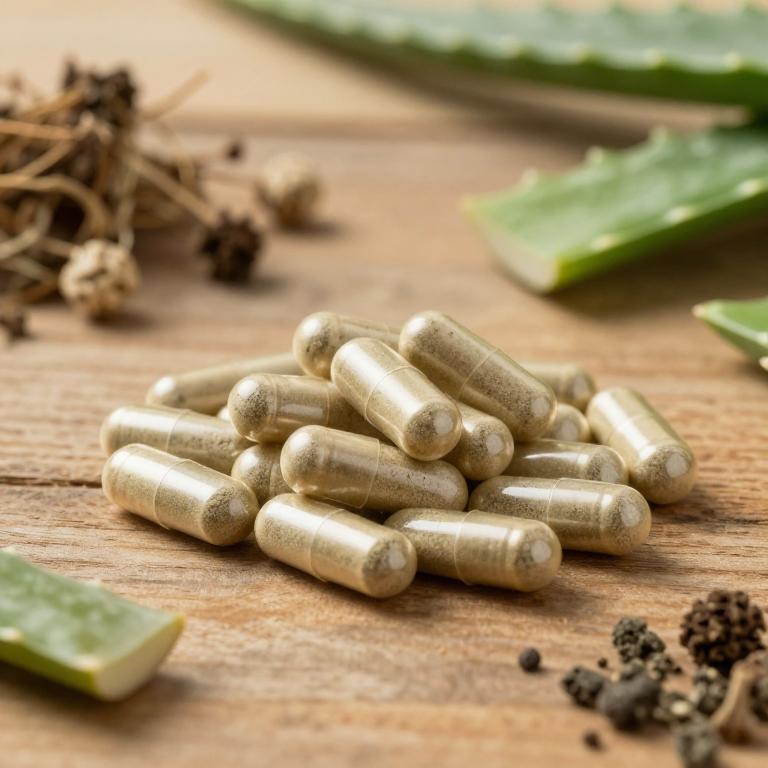
Aloe barbadensis, commonly known as aloe vera, has been studied for its potential benefits in managing inflammatory bowel disease (IBD), including ulcerative colitis and Crohn's disease.
The herbal capsules derived from aloe vera contain a variety of bioactive compounds, such as polysaccharides, enzymes, and antioxidants, which may help reduce inflammation in the gastrointestinal tract. Some research suggests that aloe vera can modulate the immune response and promote the healing of damaged intestinal lining, potentially alleviating symptoms associated with IBD. However, while preliminary studies show promise, more clinical trials are needed to fully understand its efficacy and safety in long-term treatment.
As a complementary therapy, aloe barbadensis capsules may support conventional treatments, but they should not replace medical advice or prescribed medications without consulting a healthcare professional.
5. Blessed thistle (Cnicus benedictus)
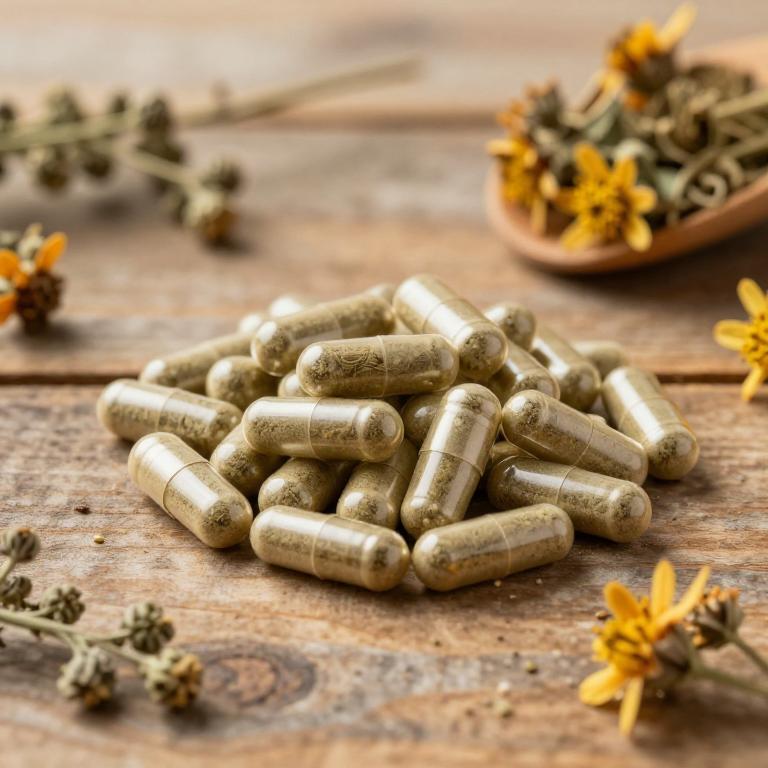
Cnicus benedictus, also known as blessed thistle, is a herbal remedy that has been traditionally used for its potential anti-inflammatory properties.
Herbal capsules containing Cnicus benedictus are often marketed for their ability to support digestive health and may be considered as a complementary therapy for inflammatory bowel disease (IBD). Some studies suggest that compounds in blessed thistle may help reduce inflammation in the gastrointestinal tract, which is a key feature of conditions like Crohn's disease and ulcerative colitis. However, more clinical research is needed to confirm its efficacy and safety for IBD patients.
As with any supplement, it is important to consult a healthcare provider before using Cnicus benedictus capsules, especially for individuals with existing health conditions or those taking other medications.
6. False leaf (Phyllanthus amarus)
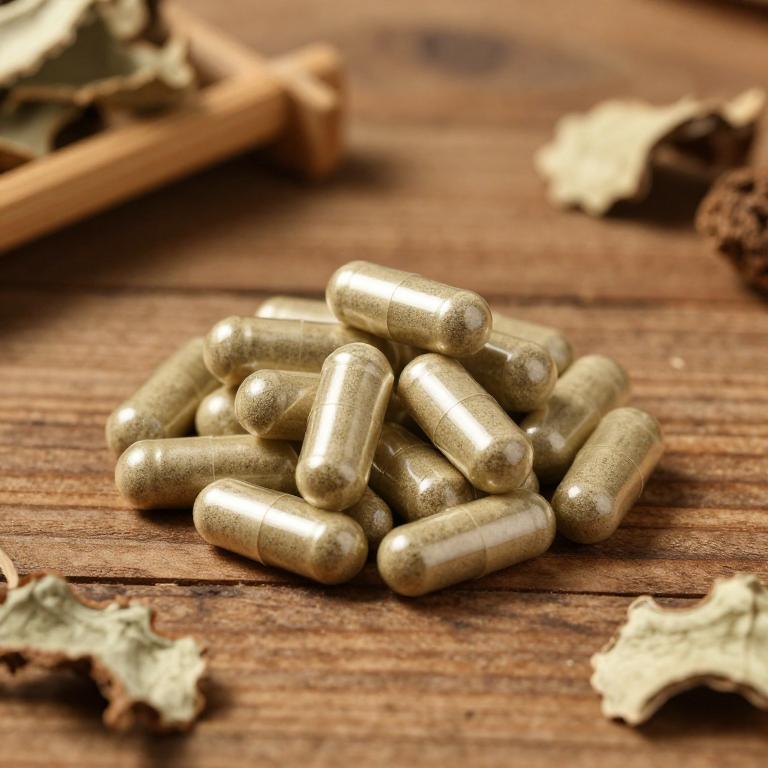
Phyllanthus amarus, commonly known as stonebreaker, is a herbal plant that has been traditionally used in Ayurvedic medicine for its anti-inflammatory and hepatoprotective properties.
Recent studies suggest that the herbal capsules of Phyllanthus amarus may offer therapeutic benefits for inflammatory bowel disease (IBD) due to their ability to modulate immune responses and reduce intestinal inflammation. The active compounds in these capsules, such as flavonoids and alkaloids, are believed to inhibit pro-inflammatory cytokines and oxidative stress, which are key factors in IBD progression. Preliminary clinical trials indicate that Phyllanthus amarus herbal capsules may help alleviate symptoms like abdominal pain, diarrhea, and inflammation in IBD patients.
However, more extensive research is needed to fully understand its efficacy and safety in long-term management of the condition.
7. Common grape (Vitis vinifera)
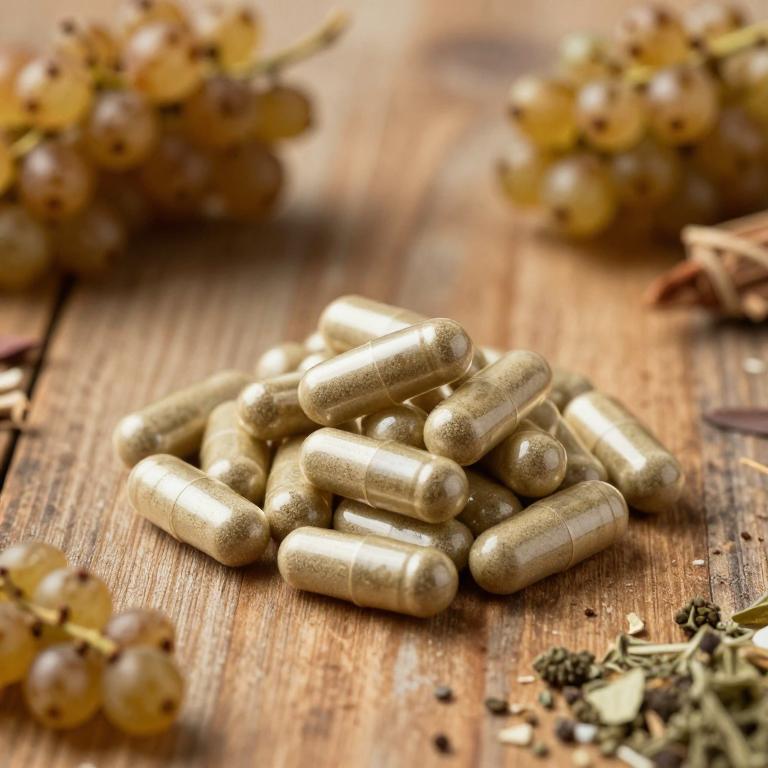
Vitis vinifera herbal capsules, derived from the grapevine plant, have been explored for their potential therapeutic effects in managing inflammatory bowel disease (IBD).
These capsules contain resveratrol, a powerful antioxidant and anti-inflammatory compound known to modulate immune responses and reduce oxidative stress. Preliminary studies suggest that Vitis vinifera may help alleviate symptoms of IBD by suppressing pro-inflammatory cytokines and promoting gut mucosal healing. However, more clinical trials are needed to confirm its efficacy and safety in human patients with IBD.
Despite promising findings, Vitis vinifera should be used as a complementary therapy under the guidance of a healthcare professional.
8. Stinging nettle (Urtica dioica)

Urtica dioica, commonly known as stinging nettle, has been explored as a potential herbal remedy for inflammatory bowel disease (IBD) due to its anti-inflammatory and antioxidant properties.
Herbal capsules containing Urtica dioica are often used as a complementary therapy to support digestive health and reduce inflammation in conditions such as ulcerative colitis and Crohn's disease. Preliminary studies suggest that the plant's bioactive compounds may help modulate the immune response and protect the intestinal lining. However, more clinical research is needed to fully understand its efficacy and safety in IBD management.
Patients should consult with a healthcare provider before using Urtica dioica capsules to ensure they are appropriate for their individual health condition.
9. Licorice (Glycyrrhiza glabra)

Glycyrrhiza glabra, commonly known as licorice root, has been traditionally used in herbal medicine for its anti-inflammatory and immunomodulatory properties.
Recent studies suggest that glycyrrhiza glabra herbal capsules may help alleviate symptoms of inflammatory bowel disease (IBD) by reducing intestinal inflammation and modulating the immune response. The active compounds in licorice, such as glycyrrhizin and flavonoids, are believed to inhibit pro-inflammatory cytokines and protect the gut lining. However, long-term use of licorice root can lead to side effects like hypertension and fluid retention due to its mineralocorticoid-like effects.
As a result, it is often recommended to use licorice-based supplements under medical supervision, especially for individuals with IBD.
10. Indian barberry (Berberis aristata)
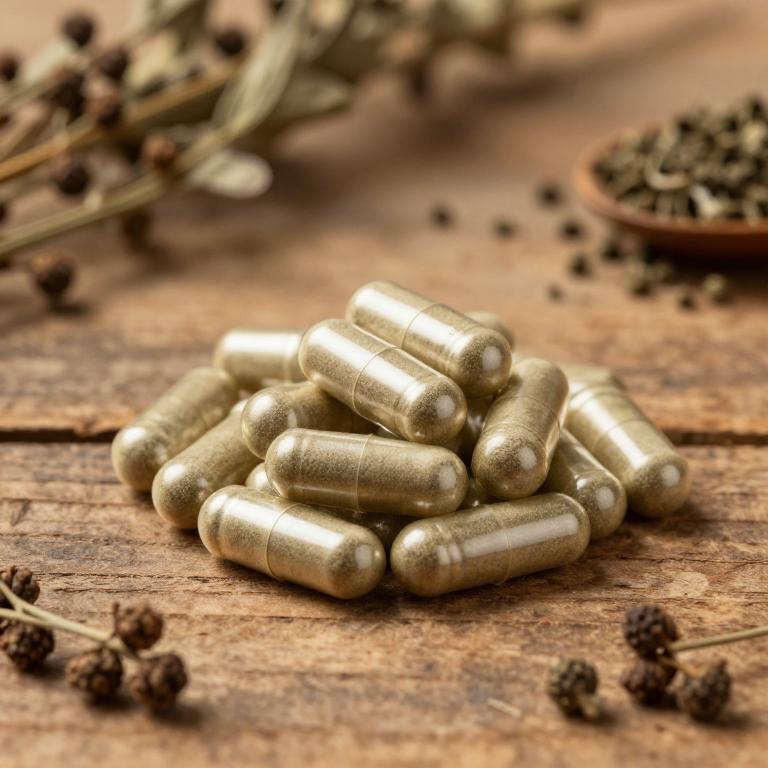
Berberis aristata, commonly known as Indian barberry, contains the active compound berberine, which has been studied for its potential anti-inflammatory and antimicrobial properties.
Herbal capsules made from Berberis aristata may help reduce inflammation in the gastrointestinal tract, making them a promising complementary therapy for individuals with inflammatory bowel disease (IBD). Some research suggests that berberine can modulate gut microbiota and enhance the integrity of the intestinal barrier, potentially alleviating symptoms associated with conditions like ulcerative colitis and Crohn's disease. However, while preliminary studies show promise, more clinical trials are needed to establish its efficacy and safety in IBD patients.
As with any herbal supplement, it is important to consult a healthcare provider before incorporating Berberis aristata capsules into a treatment plan for IBD.